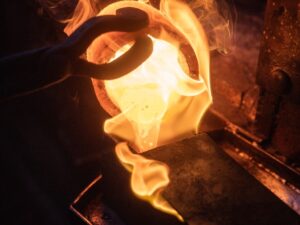COVID-19 has only strengthened Europe’s resolve to build its own battery metals supply chain

Pic: John W Banagan / Stone via Getty Images
The COVID-19 pandemic has dented supply chains around the globe, making Europe more determined than ever to secure its own battery supply chain and drastically reduce its reliance on China.
While industries around the world have been impacted by the virus outbreak, with manufacturing and production being dialled back until the crisis is over, European governments are accelerating their financial commitments into battery metals projects.
Germany (over $1bn), France ($700m) and Poland ($130m) have all previously announced big cash injections into their respective battery industries.
And those are just individual government initiatives. The European Union has so far dropped in about $US550m ($865.5m), of a budgeted $US88bn, into battery metals projects, while the European Commission is investing €3.2bn ($5.5bn) in battery research and innovation across Belgium, Finland, France, Germany, Italy, Poland and Sweden.
“The amount of money that Europe is ploughing into this industry eclipses pretty much every other economy, certainly every other western economy,” Keith Coughlan, managing director of lithium explorer European Metals Holdings (ASX:EMH), told Stockhead.
“And the interesting thing is, what we’ve seen in the last few months with regards to COVID-19 has only highlighted more the need and desire to have a local supply chain and not be reliant on other jurisdictions, particularly Asia.
“There will be less cars produced this year and there will be less batteries produced this year. However, it doesn’t diminish the commitment in the EU to an electric vehicle future.”
Government-backed utilities are also getting into the game, as they ramp up their shift away from coal towards renewables and energy storage.
On Friday, shareholders approved a deal between European Metals and CEZ Group, which is 70 per cent owned by the government of the Czech Republic and is one of Central and Eastern Europe’s largest power utilities.
CEZ is also listed on the Prague and Warsaw stock exchanges and has a market cap of around $US9bn ($14.1bn).
The CEZ deal will see the utility take a 51 per cent stake in European Metals’ subsidiary that owns the Cinovec lithium and tin project in exchange for a cash injection of €29.1m.
The news sent shares in CEZ up nearly 40 per cent to close Friday at 25c.
European Metals obviously had to weigh up the pros and cons of being diluted to a minority stake in the project, but in the end the company decided the deal would be a win-win.
“We didn’t really want to give away majority ownership, but it came with such significant positives with regards to funding security and the relationship with the Czech government vis a vis permitting, vis a vis connections in the EU and significant industry in Europe that it became a very attractive deal for us to embark on,” Coughlan said.
“We remain as the manager for the project going forward. We still get to have that significant level of input and basically we’ve done a deal that sees the project now fully funded through to a decision to construct.”
While European Metals now has a minority 49 per stake in the Cinovec project, Coughlan says the deal “significantly de-risked” the project.
“So we’ve got 49 per cent of a project that has an NPV [net present value] of about $US1.2bn with an IRR [internal rate of return] of 29 per cent in the EU that can produce either battery grade lithium hydroxide or battery grade lithium carbonate in the bottom half of the global cost curve,” he said.
Carmakers big moneymakers for Europe
In the Czech Republic, the automotive industry accounts for more than 9 per cent of its GDP.
“The automotive industry is a leading industry in Europe,” Stefan Müller, CEO of Frankfurt-based consultancy DGWA, told Stockhead.
DGWA is a German corporate boutique for global small and mid-cap consulting and investments. The company helps connect listed and non-listed companies to investors, financial institutions and industry, as well as to federal institutions and other subsidy and grant-giving organisations and associations.
“In the Czech Republic [the automotive industry] is very important,” Müller said. “They have Skoda, and a lot of German companies like Volkswagen and others have plants in the Czech Republic.”

European Metals’ Coughlan added that the Czech Republic manufactured more cars than any other country in the world on a per capita basis.
There is also a big push by the country’s prime minister to have Czech lithium go into Czech cars.
And European Metals will be the only lithium producer in the country when it gets up and running, an advantage that landed it a face-to-face with Skoda’s parent company Volkswagen last year.
There’s very little mining of lithium done in Europe.
“Europe has historically been the second largest importer of lithium in the world and that’s even prior to the advent of the electric vehicle industry,” European Metals’ Coughlan said.
“But they only produce about 2 per cent of the world’s lithium currently and all the lithium that is produced in Europe at the moment is used in the ceramic and glass industry, it’s not high enough grade for batteries.”
The importance of European connections
While Europe is extremely keen to secure its spot as a leader in the uptake of EVs and have its own world-leading supply chain, it won’t do it at any cost.
To secure a lucrative deal, DGWA’s Müller says international mining companies need to develop good relations with European governments.
One of DGWA’s clients, TSX-listed Almonty Industries, just received a $US76m financing from German and Austrian Development Banks KfW and OEkB.
Aussie listed Infinity Lithium (ASX:INF) is another company that recently received European funding. It was the first lithium project to secure $1.5m in funding and ongoing support under the Business Investment Platform, an initiative organised by the European Battery Alliance.
The company is developing the San Jose lithium project in Spain.
“You cannot develop a mine in a developed industrial country like the Czech Republic, Spain or Austria like you do in Africa for example, you have to have these close connections to the government, to other associations, to federal and EU organisations and they have to have a good feeling when they give you money,” Müller explained.
“And this is something that European Metals has done very well.”
An example of where a company has missed out on European money because of its lack of connections is Western Australia-based European Lithium (ASX:EUR).
The company is trying to advance its Wolfsberg lithium project in Austria towards production.
Europe has “an industry that includes lithium and cobalt and others, where the Europeans give you millions and millions and millions of dollars and if you play that card well you receive that money”, Müller said.
“European Lithium is managed from Australia only and they haven’t received any subsidies yet and they won’t if they don’t set up closer relations.”
Müller was previously a director of European Lithium but stepped down from the board in early March. He was trying to strengthen the company’s ties with Europe, but differing views led to him exiting the company.
“I still believe in the project, but to succeed the company needs to show serious commitment to Europe – easiest with a local and experienced management,” Müller said.
“More than 50 per cent of EUR’s shareholders are based in Europe and they have a similar view.”
Since the start of the year, European Lithium’s share price has tumbled nearly 62 per cent to its last traded price of 4.2c.
Opening doors for juniors
Although the development of European Metals’ Cinovec project is at a relatively early stage, the company already has end users knocking on its door.
“We’ve been in preliminary talks with offtakers for some period of time, and the reason that offtakers were having to engage in conversations at what would otherwise be a fairly early stage of our development was simply the supply-demand for lithium, particularly in the EU,” Coughlan said.
“So those discussions were always going to ramp up as we got formally into our feasibility study.”
And now with CEZ in its corner, more end users are keen to get their hands on European Metals’ lithium.
“Now that we have CEZ on board, what we’ve seen happen is the level of discussion we’re having on offtake has increased dramatically,” Coughlan said.
“So [CEZ] can clearly open some doors for us that a little West Aussie mining wannabe has a lot more trouble unlocking, and those are doors within Europe but other parts of the world as well.”
Given CEZ’s government backing, the utility has more sway with the battery manufacturers, according to Coughlan.
“There are a number of Asian battery manufacturers who have built or are building battery factories in the region,” he explained.
“CEZ have announced publicly that they have ambitions to be involved in a consortium to build a battery factory in the Czech Republic not far from the [European Metals] deposit.
“So they are talking with various battery manufacturing companies that are household names about doing just that. It raises the level of conversation that we can off on potential offtake.”
The deal with CEZ does not give the utility a monopoly over the majority of European Metals’ lithium. The company is free to negotiate separate offtake deals on favourable commercial terms.
“Certainly we are being taken more seriously by these big companies, in Brussels also, and it is now perceived that our project will go ahead because of the financial and political security that CEZ offers.”
Related Topics

UNLOCK INSIGHTS
Discover the untold stories of emerging ASX stocks.
Daily news and expert analysis, it's free to subscribe.
By proceeding, you confirm you understand that we handle personal information in accordance with our Privacy Policy.








